Ever felt constantly tired even after a full night’s sleep? Or noticed your focus slipping during work hours? Sometimes it’s not just about stress or lack of rest—it could be your diet. One key nutrient that often gets overlooked is vitamin B12. This vitamin plays a vital role in energy production, red blood cell formation, and overall brain health.The good news? By adding the right vitamin B12 foods into your meals, you can give your body the fuel it needs to feel sharper and more energized.
Let’s break down why B12 is so important, which foods are packed with it, and how you can easily include them in your daily diet without overcomplicating things.
You can also Listen to our podcast here,
Why Vitamin B12 Matters So Much? 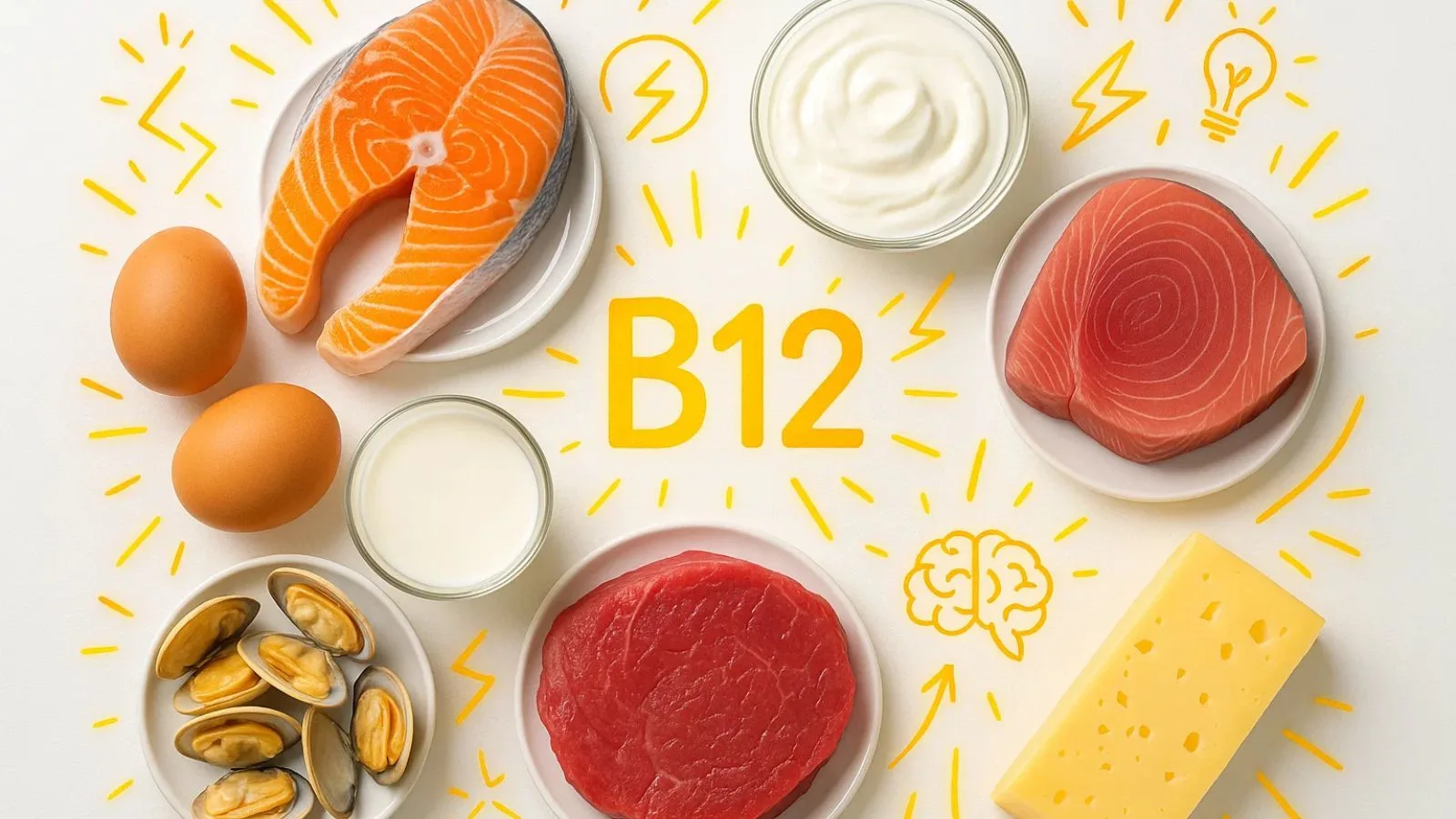
Vitamin B12 is essential for several body functions. It helps produce DNA, supports nerve health, and prevents anemia by making sure your red blood cells stay healthy. Without enough of it, people can experience fatigue, weakness, mood swings, or even nerve damage in the long run.
Athletes often look for vitamin B12 foods to boost stamina and improve recovery. Office workers and students also benefit from it because B12 supports mental clarity and focus. Studies even suggest it helps lower the risk of memory issues later in life.
A deficiency is more common than people realize, especially among vegetarians, vegans, and older adults. That’s why understanding which foods naturally provide B12 is such a game-changer.
Also Read,
Which Foods Have More Vitamin B12 Naturally?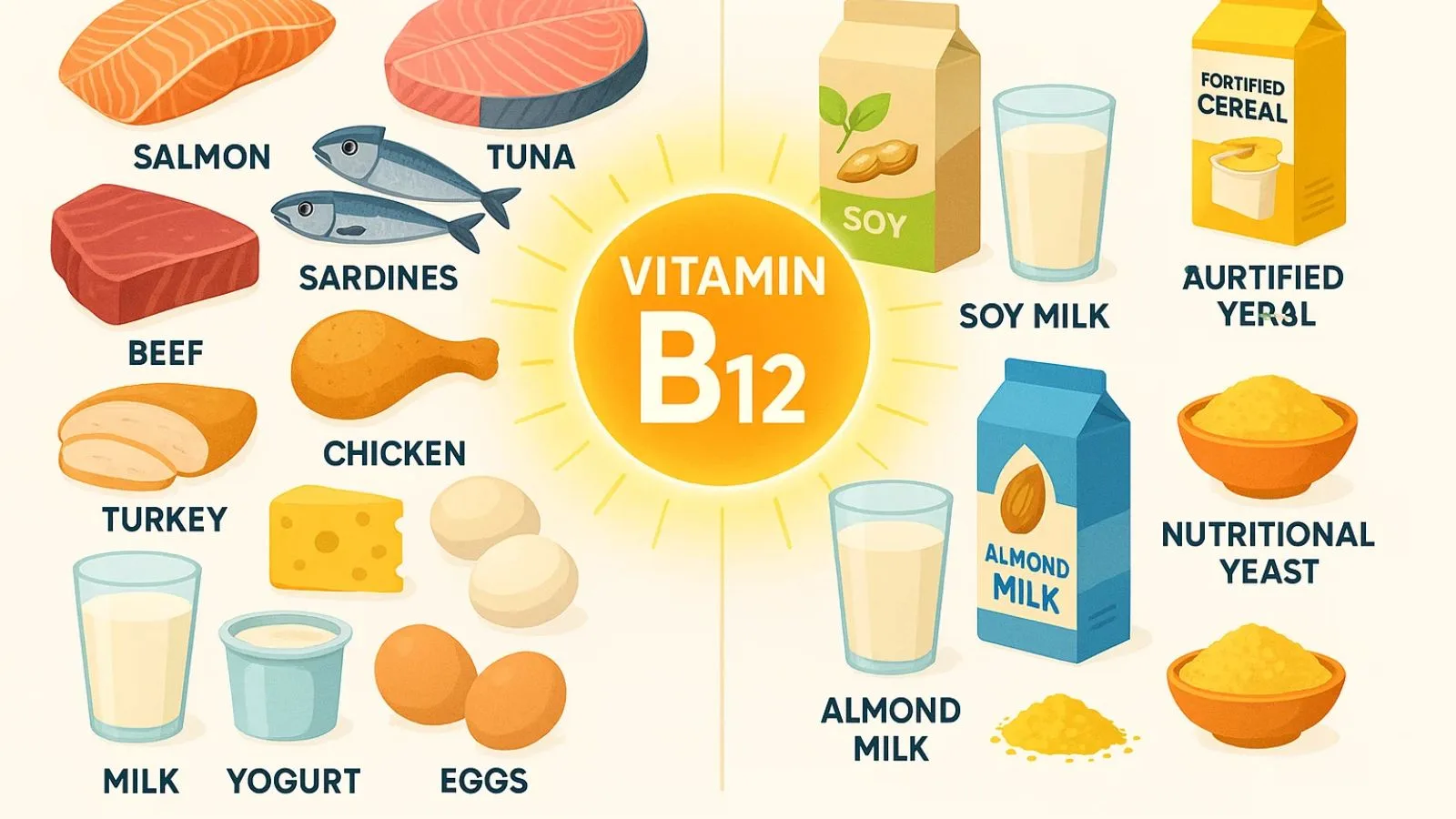
When you think of which foods have more vitamin B12 naturally, the first answer is animal-based foods. Seafood, meat, eggs, and dairy are the richest sources.
Here’s a breakdown of B12-rich options:
- Clams – 84 mcg per 3 ounces (over 3,500% of the daily value!)
- Salmon – 4.8 mcg per 6 ounces
- Tuna – 9.3 mcg per 6 ounces
- Beef liver – 70 mcg per 3 ounces
- Eggs – 1.1 mcg per 2 eggs
- Milk & cheese – 1 mcg per cup of milk or ounce of cheese
For vegetarians or vegans, the challenge is that natural plant-based foods don’t usually contain B12. But there are fortified foods like plant milks, breakfast cereals, and nutritional yeast that help fill the gap. These vitamin B12 foods make it possible to meet daily requirements without animal products.
Also Read,
Natural Sources of Vitamin B12 in Daily Diet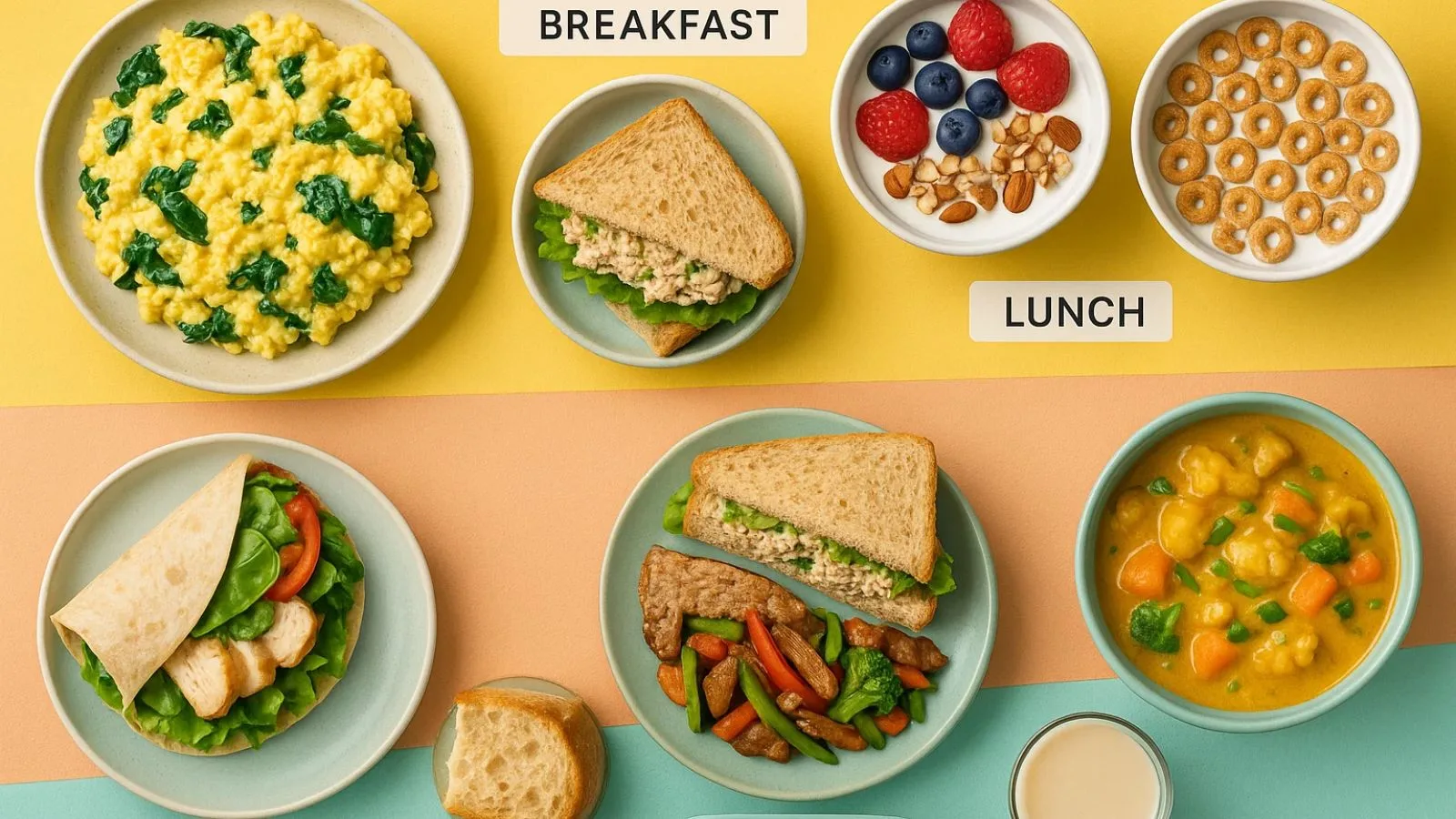
The easiest way to build a diet full of natural sources of vitamin B12 in daily diet is to focus on variety. For meat eaters, rotating between poultry, seafood, and red meat ensures a consistent intake.
Vegetarians can rely on eggs, cheese, and fortified dairy alternatives. Vegans, on the other hand, need to be more strategic—using fortified cereals, plant milks, and supplements as needed.
Here’s a quick grocery list to make it practical:
- Salmon, tuna, and mackerel
- Chicken breast or turkey
- Yogurt, milk, and hard cheeses
- Eggs for breakfast or quick snacks
- Fortified soy, almond, or oat milk
- Nutritional yeast sprinkled on pasta or salads
These vitamin B12 foods fit into everyday meals without requiring a drastic lifestyle change.
Snacks Rich in Vitamin B12 for Weight Loss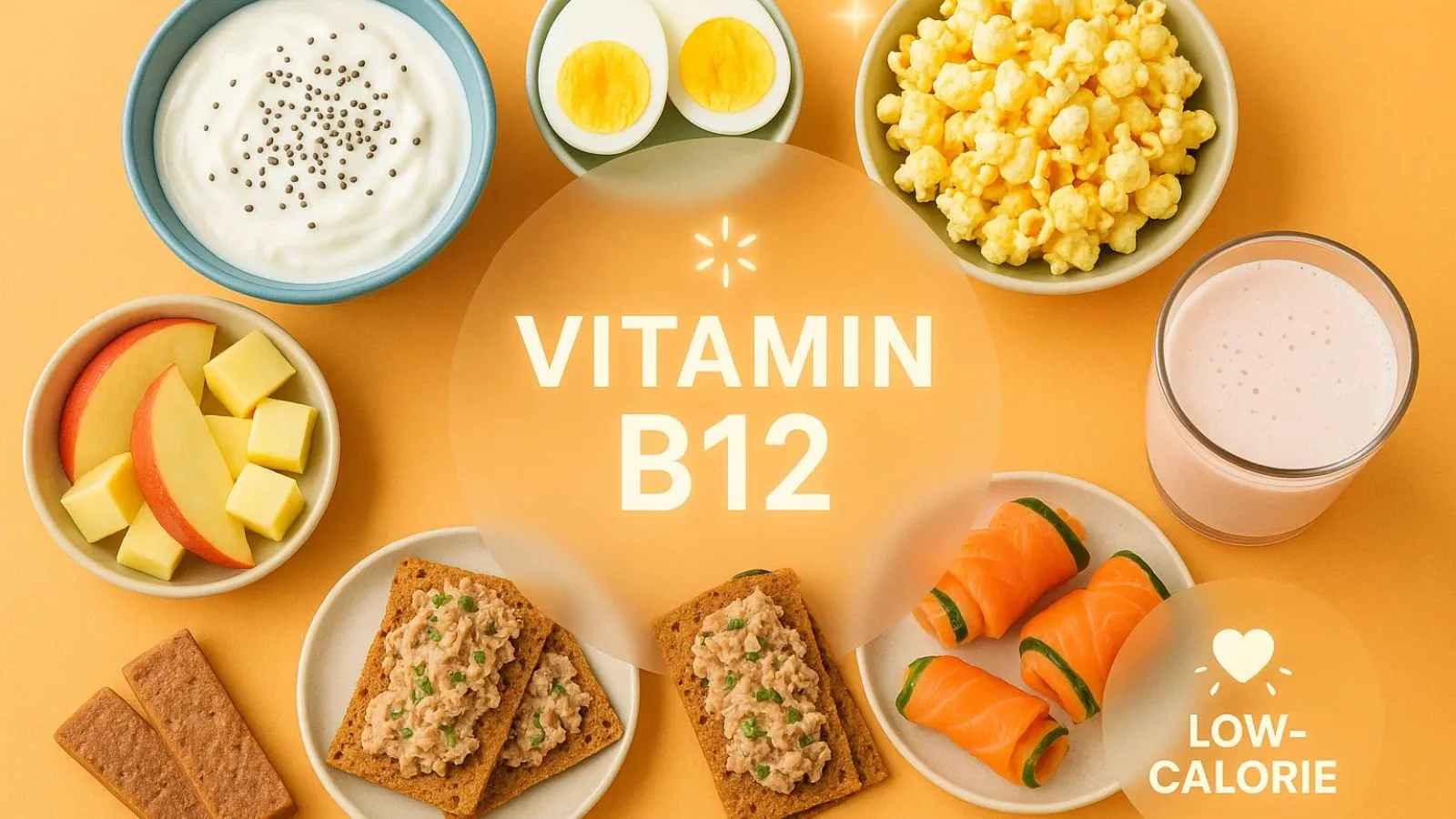
If you’re aiming for healthier snacking, there are plenty of snacks rich in vitamin B12 for weight loss that also keep cravings in check. Here are some tasty ideas:
- Greek yogurt with chia seeds – Protein-packed and high in B12.
- Boiled eggs – Quick, portable, and only about 70 calories each.
- Cheese cubes – Great with apple slices for a balance of protein and fiber.
- Tuna salad on whole-grain crackers – Light yet filling.
- Fortified protein bars – A convenient option when on the move.
- Nutritional yeast popcorn – A vegan-friendly snack that’s flavorful and nutrient-rich.
- Smoked salmon rolls with cucumber – Low-carb, rich in omega-3s and B12.
- Low-fat milkshake with fortified soy milk – Both refreshing and nourishing.
By combining these options, you can enjoy snacks that are both tasty and filling, aligning with your nutrition goals. All of these are excellent vitamin B12 foods that support weight management.
Meal Plans Including Vitamin B12 Foods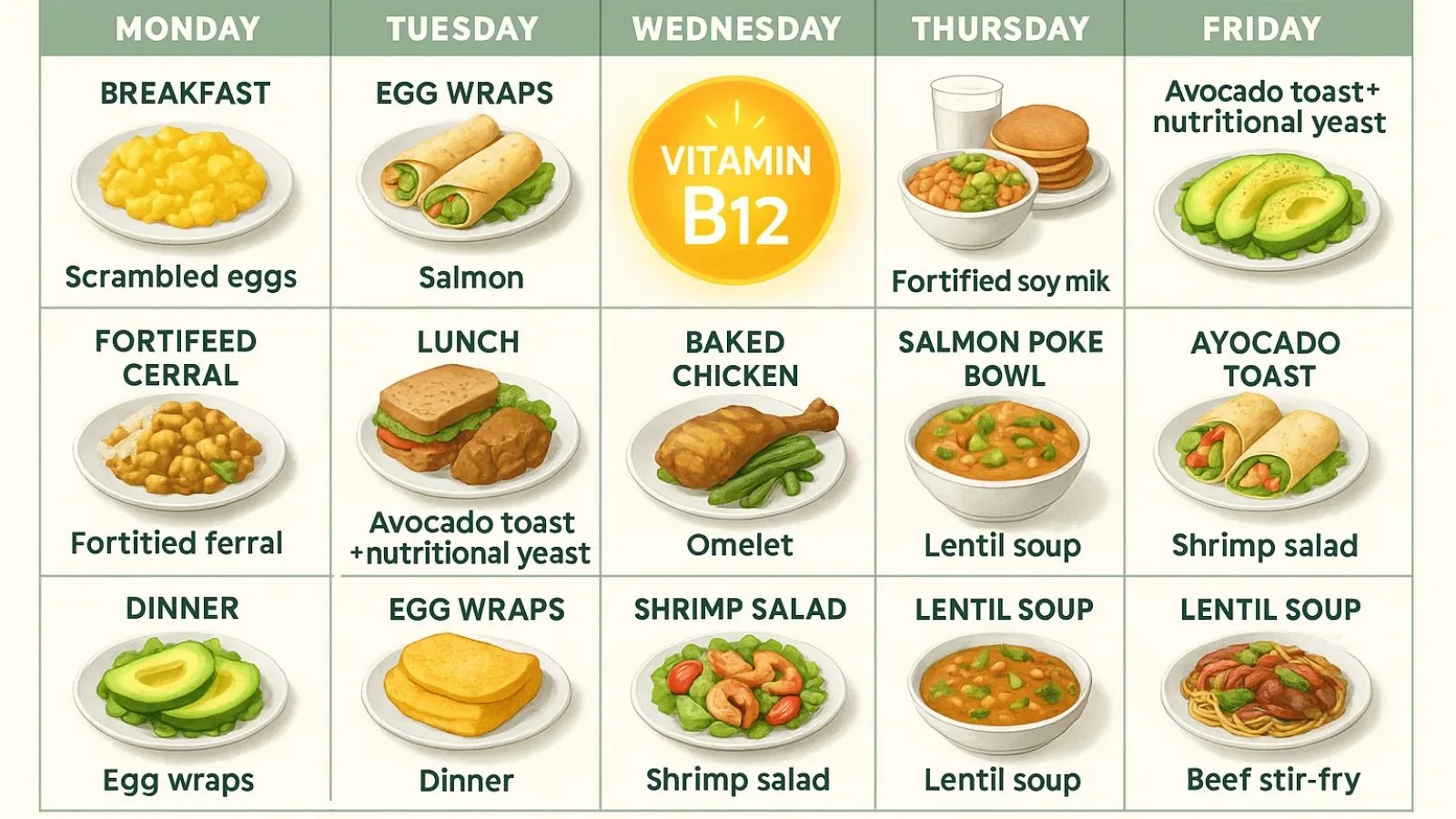
Sometimes it’s easier to see things laid out in a plan. Here’s a simple 5-day guide that integrates meal plans including vitamin B12 foods:
Day 1
- Breakfast: Scrambled eggs with spinach and whole-grain toast
- Lunch: Grilled salmon with quinoa and broccoli
- Snack: Greek yogurt with nuts
- Dinner: Turkey stir-fry with mixed vegetables
2
- Breakfast: Fortified cereal with milk
- Lunch: Tuna salad sandwich on whole-grain bread
- Snack: Cheese sticks with carrot sticks
- Dinner: chicken curry with rice and peas
3
- Breakfast: Avocado toast topped with nutritional yeast
- Lunch: Egg and veggie wrap
- Snack: Protein bar (fortified with B12)
- Dinner: Baked chicken breast with mashed sweet potatoes
4
- Breakfast: Omelet with mushrooms and cheese
- Lunch: Grilled shrimp salad with lemon dressing
- Snack: Almond milk smoothie
- Dinner: Lentil soup with fortified bread
5
- Breakfast: Pancakes made with fortified soy milk
- Lunch: Salmon poke bowl with rice and seaweed
- Snack: Boiled eggs with fruit
- Dinner: chicken stir-fry with noodles and veggies
This plan mixes traditional and modern meals, showing just how simple it can be to include vitamin B12 foods every single day.
Also read,
Best Vitamin B12 Foods vs Supplements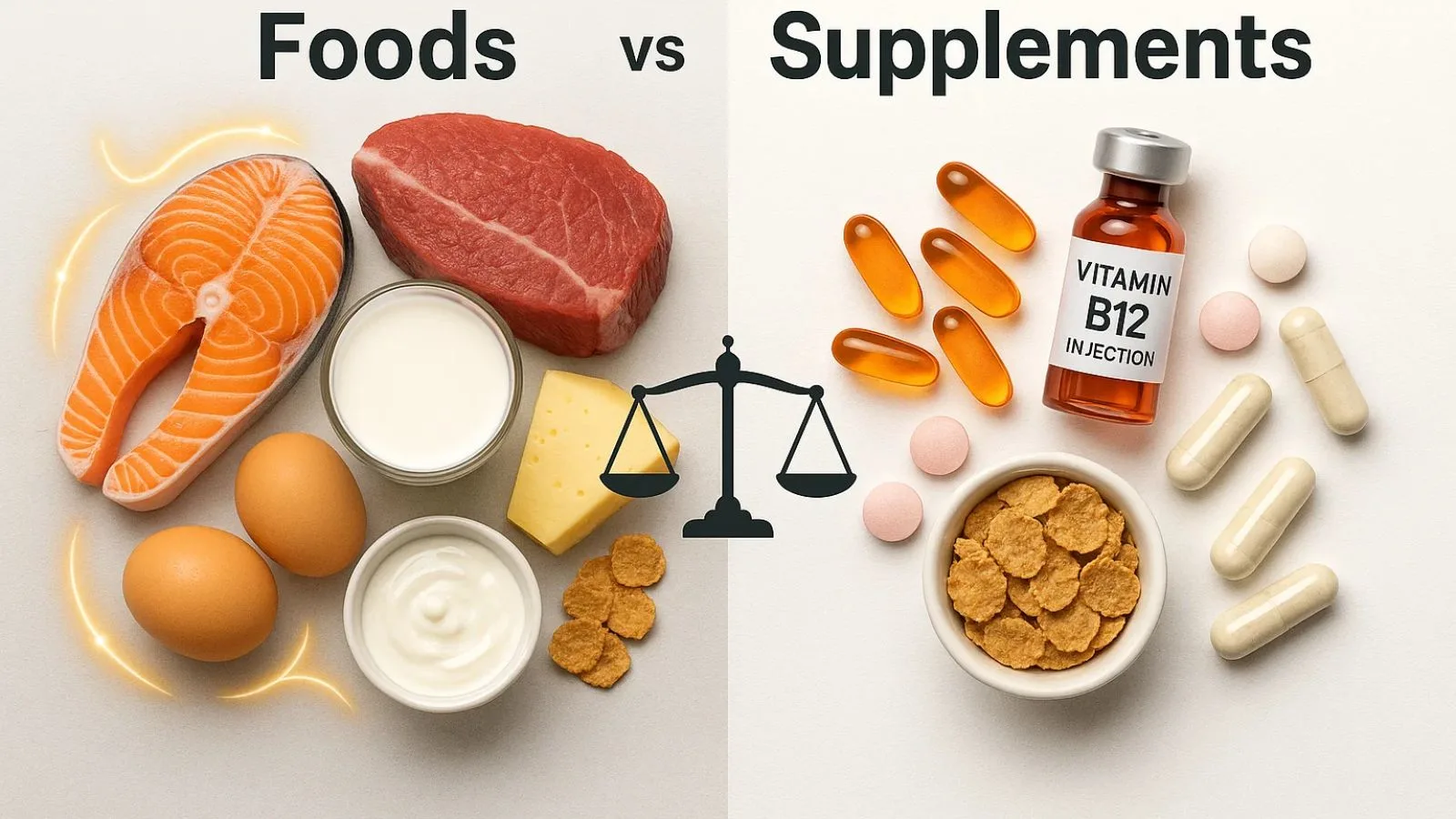
Now comes the big question: best vitamin B12 foods vs supplements, which one is better?
- Vitamin B12 Foods: Provide additional nutrients like protein, calcium, and omega-3 fatty acids. They’re also absorbed efficiently by the body when eaten with balanced meals.
- Supplements: Useful for vegans, vegetarians, and older adults with absorption issues. They come in tablets, capsules, or even injections prescribed by doctors.
Supplements ensure you meet your daily needs, but they shouldn’t replace food completely. Think of them as a backup. Whenever possible, prioritize whole vitamin B12 foods for a well-rounded diet.
How to Add Vitamin B12 Foods Easily to Your Diet?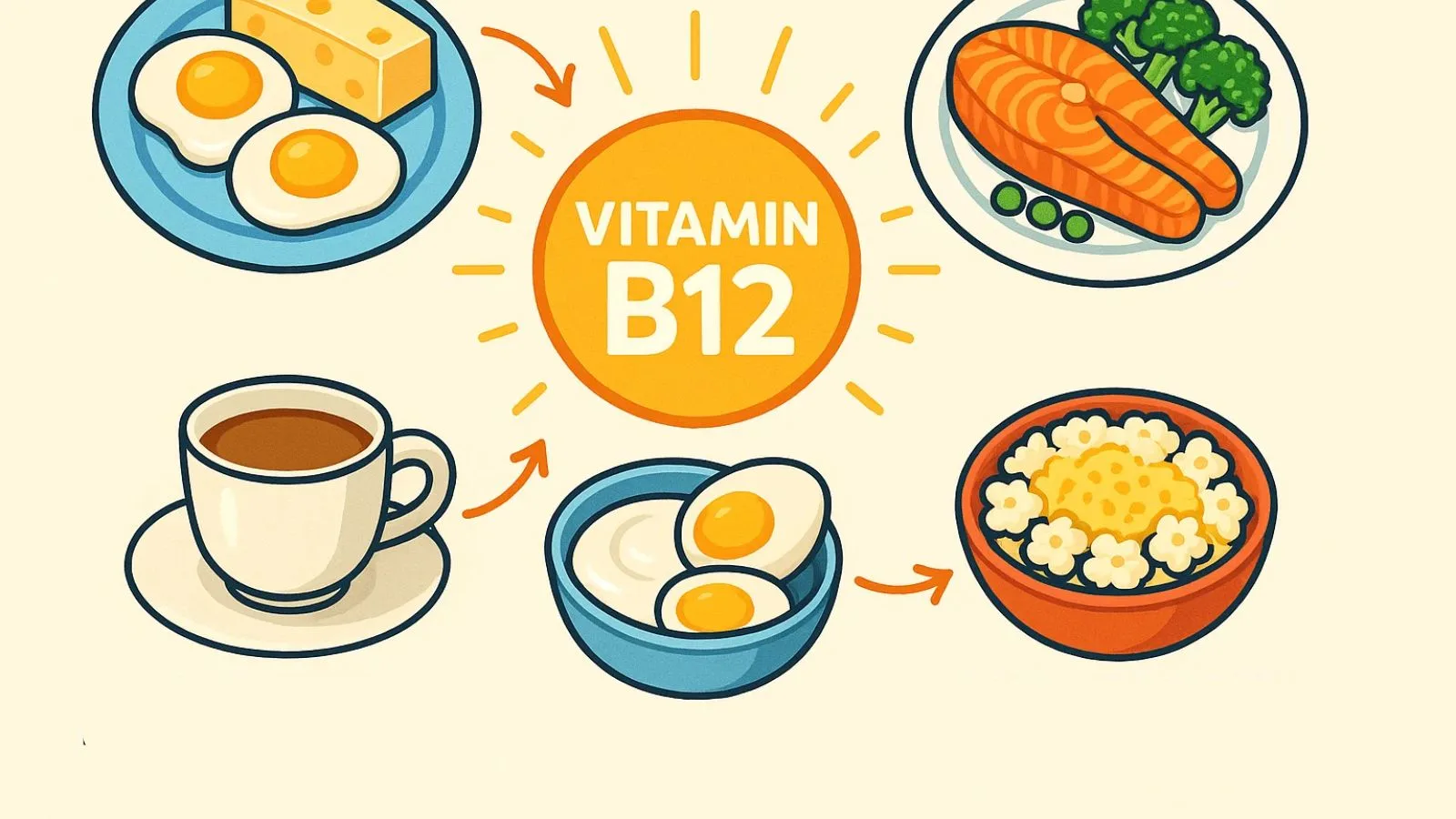
Making small adjustments can go a long way. If you’re wondering how to add vitamin B12 foods to your diet, here are simple tips:
- Add cheese or eggs to your breakfast routine.
- Include fish like tuna or salmon in weekly dinners.
- Use fortified plant milks in your coffee or cereal.
- Sprinkle nutritional yeast on popcorn or pasta.
- Keep boiled eggs or yogurt handy for quick snacks.
You don’t need an extreme diet overhaul. By slowly introducing more vitamin B12 foods, you’ll naturally meet your daily requirements.
How Calorie Tracker Buddy Helps You Stay on Track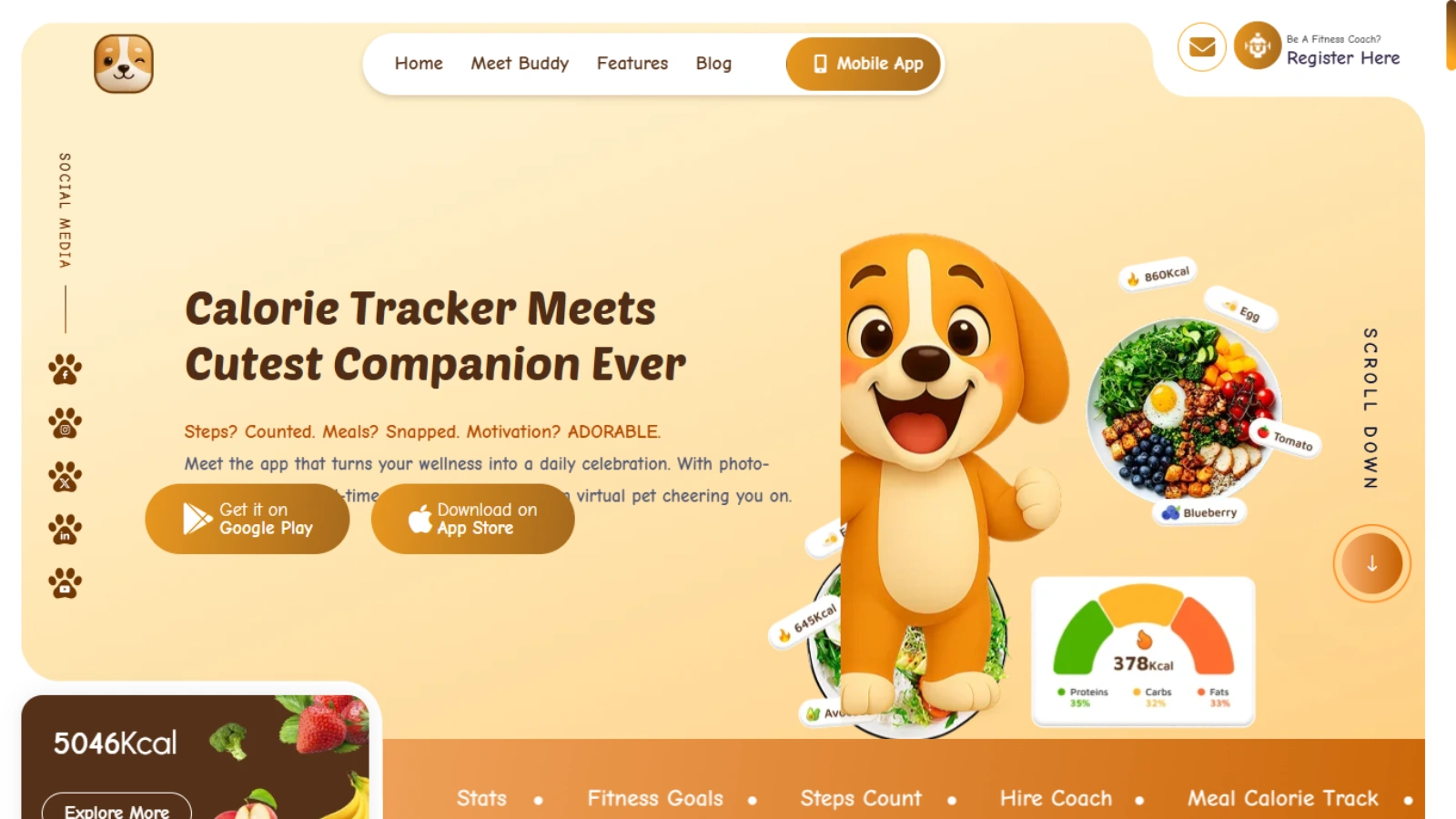
Planning is one thing, but tracking ensures consistency. That’s where Calorie Tracker Buddy comes in.
Here’s how you can use it to make sure you’re getting enough vitamin B12 foods:
- Log Your Meals: Every time you eat, record it in the app to instantly see your nutrient intake.
- Nutrient Breakdown: Check how much B12, protein, and other vitamins you’re consuming daily.
- Meal Planning Made Easy: Build weekly plans that focus on B12-rich meals.
- Progress Tracking: See how consistent food choices are improving your energy and overall health.
Instead of guessing, you get a clear picture of how your diet supports your lifestyle. It’s the simplest way to make sure you’re actually getting the benefits of all those vitamin B12 foods.
Conclusion
From energy levels to brain health, vitamin B12 plays a crucial role in everyday life. Adding more vitamin B12 foods like eggs, dairy, seafood, or fortified plant-based options can keep your diet balanced and your body running smoothly.
And with tools like CalorieTrackerBuddy, you don’t just eat healthier, you track your progress, adjust your meals, and stay consistent with ease. The result? A more energized, focused, and healthier you.
FAQs
Q1. Can vegans get enough vitamin B12 from foods alone?
Not easily. Since natural plant-based sources don’t contain much B12, vegans should rely on fortified foods and supplements to meet their daily needs.
Q2. What are the first signs of vitamin B12 deficiency?
Common signs include fatigue, pale skin, tingling in hands or feet, memory issues, and mood swings.
Q3. How much vitamin B12 do adults need daily?
Most adults need about 2.4 mcg per day. Pregnant and breastfeeding women may need slightly more, which can be achieved through a mix of vitamin B12 foods and supplements.
Q4. Are supplements as effective as food sources?
Supplements are effective for preventing deficiency, especially in people with absorption issues, but whole foods offer additional nutrients that pills alone can’t provide.![]()